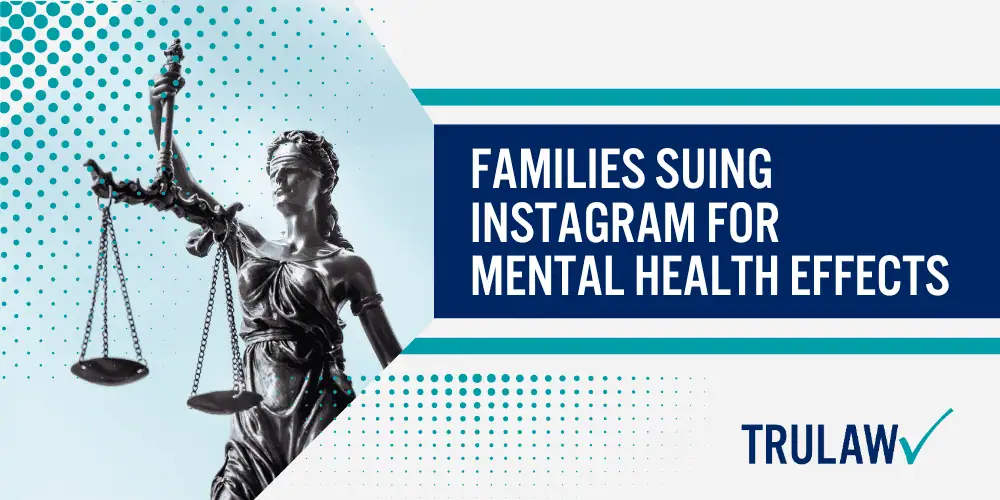Instagram Lawsuit: Instagram Mental Health Lawsuit
- Last Updated: June 18th, 2025

Attorney Jessica Paluch-Hoerman, founder of TruLaw, has over 28 years of experience as a personal injury and mass tort attorney, and previously worked as an international tax attorney at Deloitte. Jessie collaborates with attorneys nationwide — enabling her to share reliable, up-to-date legal information with our readers.
Legally Reviewed
This article has been written and reviewed for legal accuracy and clarity by the team of writers and legal experts at TruLaw and is as accurate as possible. This content should not be taken as legal advice from an attorney. If you would like to learn more about our owner and experienced injury lawyer, Jessie Paluch, you can do so here.
Fact-Checked
TruLaw does everything possible to make sure the information in this article is up to date and accurate. If you need specific legal advice about your case, contact us by using the chat on the bottom of this page. This article should not be taken as advice from an attorney.
Key takeaways:
- Instagram is facing a lawsuit that alleges the platform's algorithms and features are harmful to the mental health of its users, particularly young users.
- The lawsuit claims that Instagram's parent company, Meta (formerly Facebook), was aware of the negative effects but chose to prioritize profits over user well-being.
- The suit also highlights internal research from Instagram that showed the platform exacerbated body image issues for one in three teenage girls.
Instagram Lawsuit: Instagram Mental Health Lawsuit
The widely-used social media platform, Instagram, often popular in school days, has recently been subjected to significant public scrutiny due to concerns about privacy, prompting a post-action lawsuit.
The platform is currently embroiled in a substantial action lawsuit, potentially leading to a significant settlement and suspension from school.
A lawsuit against Instagram has been lodged, underlining the imperative for measures to mitigate the harmful mental health impacts associated with the use of the platform.
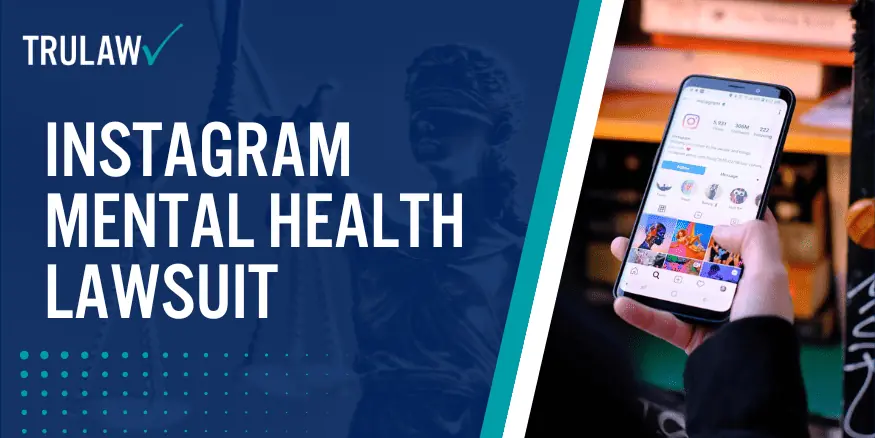
The potential correlation between school student’s Instagram usage and mental health issues is a growing concern.
Evidence from internal research and documents provided by Google has highlighted the adverse experiences encountered by users, leading to possible suspension or even a suit.
This article will investigate further into the details of this concerning school situation that is currently making news.
Table of Contents
Families Suing Instagram for Mental Health Effects
Instagram Lawsuit
In recent years, there has been a rise in the number of student families from various schools who have filed suit against Instagram, leading to several settlement cases.
They assert that the widely used social media platform has had a substantial influence in intensifying mental health issues among school students, leading to a quick settlement of the suit.
These legal actions, often in the form of student suits, contend that extended usage of Instagram has resulted in depression and anxiety.
This is particularly notable among young individuals still in school, leading to numerous settlements.
Holding Instagram Accountable: Allegations and Concerns Raised by Families
In a class action lawsuit against Instagram, the student claimants from a school assert that Instagram did not sufficiently warn about the potential damage that can result from overuse.
They argue that Facebook, which owns Instagram, must be held responsible for the adverse effects that it has inflicted on numerous school students and individuals.
The Influence of Instagram on Students’ Self-Esteem and Mental Well-Being
A significant concern raised by school families pertains to the influence of Instagram on their students, especially school-going adolescents.
The continuous exposure of a school student to meticulously selected photographs depicting seemingly flawless lives can foster unrealistic expectations and a sense of inadequacy.
This compulsion to adhere to an idealized version of reality can negatively impact a student’s mental health, particularly during their school years.
Parents have reported distressing instances of their student daughters developing low self-esteem and body image problems as a result of spending extensive periods scrolling through Instagram.
The continuous comparison with others’ edited lives can induce feelings of worthlessness in students and contribute to the onset or exacerbation of mental health disorders such as depression and anxiety in a school setting.
This article underscores the detrimental effects that social media can have on the mental health of students.
The subject matter at hand pertains to the impact of Instagram on students’ self-esteem and mental well-being.
It is argued by families that the algorithms employed by Instagram give precedence to content that garners high engagement, often favoring posts from students that receive a large number of likes and comments.
This focus on popularity within the student environment can engender a cycle where students seek validation through online interactions.
Consequently, these students may develop a strong reliance on external approval to establish their self-worth, which can rapidly affect their mental health.
It is crucial to acknowledge that Instagram, like other social media platforms, does provide certain benefits to students, including the ability to connect with others and express themselves.
However, families contend that these positive attributes are overshadowed by the negative impacts they observe in their student loved ones.
Legal actions have been initiated with the objective of holding companies accountable for their perceived failure to adequately protect vulnerable student social media users from potential harm.
This is evident in the Instagram lawsuit settlement.
It is urged that prompt action is required in this student-related matter.
Certain professionals have proposed the enforcement of more stringent rules and guidelines for social media platforms in order to safeguard school students.
These professionals contend that it should be obligatory for companies, especially those targeting the student population, to offer explicit warnings about the potential implications on students’ mental health, in a manner akin to the health risk labels on tobacco products.
This would guarantee a prompt reaction and cater to the needs of the students.
Instagram Lawsuit: The Link Between Instagram and Eating Disorders
Numerous empirical studies have demonstrated the harmful influence of unrealistic body images displayed on Instagram.
These images can contribute to the development of eating disorders, particularly amongst school students who use the platform excessively.
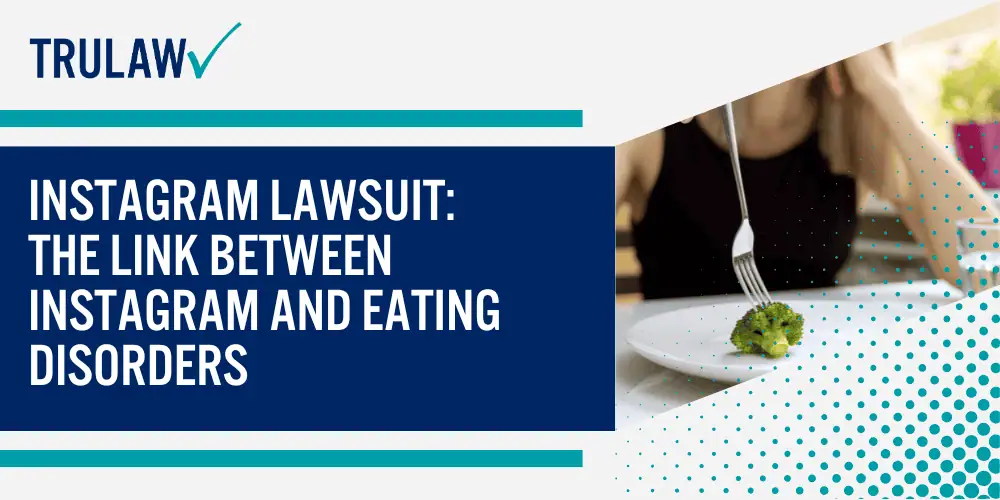
This is a significant concern, especially in relation to vulnerable demographics such as adolescents.
The Instagram mental health lawsuit offers further insights into this issue.
Lawsuits Against Instagram: The Platform’s Impact on Body Image and Mental Health
The subject matter is the lawsuits filed against Instagram by school students.
These lawsuits contend that the social media platform’s focus on physical appearance encourages an unhealthy relationship with food.
The legal cases assert that Instagram’s algorithms and design propagate a culture centered on the pursuit of an idealized beauty image, which can negatively affect mental health and hinder the progress of students.
One of the principal issues highlighted in these lawsuits is the effect of Instagram’s content-sharing features on school students.
The platform allows users, including students, to rapidly share pictures and videos of their bodies or meals, creating opportunities for comparison and potential self-image problems.
The capability to interact or comment on these posts exacerbates this problem, as users, including students, may receive detrimental comments or participate in harmful discussions about looks and weight.
Influencers and Algorithms: The Influences Behind Disordered Eating Behaviors on Instagram
The influence of public figures and celebrities on Instagram can significantly contribute to the promotion of disordered eating behaviors.
Many of these individuals endorse products, diets, or lifestyles that might not be appropriate for all students.
These endorsements can potentially misguide susceptible individuals into adopting unhealthy habits in the pursuit of unrealistic standards.
Furthermore, the algorithms utilized by Instagram have a substantial impact on shaping the user experiences of students on the platform.
These algorithms decide the content that appears on a student’s feed based on their past interactions.
As a result, if a student frequently interacts with content related to dieting or body image, they are likely to encounter more of such content.
This reinforcing cycle can intensify existing insecurities and contribute to the onset or aggravation of eating disorders.
It is also important to highlight that Instagram was recently involved in a legal dispute concerning its management of student data, which resulted in a settlement.
The influence of influencers and algorithms on Instagram has been linked to the development of disordered eating behaviors.
Not all Instagram users will develop an eating disorder, but those with predisposing factors such as low self-esteem or a history of depression may be at a higher risk.
The exposure to triggering content on this platform can have a significant impact on their mental health.
The prevalence of unrealistic body standards on Instagram can lead to feelings of inadequacy and dissatisfaction with one’s own appearance.
This can potentially trigger disordered eating behaviors.
It is imperative for school students to be aware of the content they engage with on social media platforms and to seek professional help if they feel affected by it.
The impact of Instagram on mental health is well-documented.
Social Media's Broader Impact on Mental Health Lawsuits
Despite the numerous benefits that social media platforms offer, they have also been associated with a range of mental health issues.
The constant exposure to idealized representations of others’ lives, cyberbullying, and the pressure to gain approval through likes and comments can lead to feelings of inadequacy, anxiety, and depression.
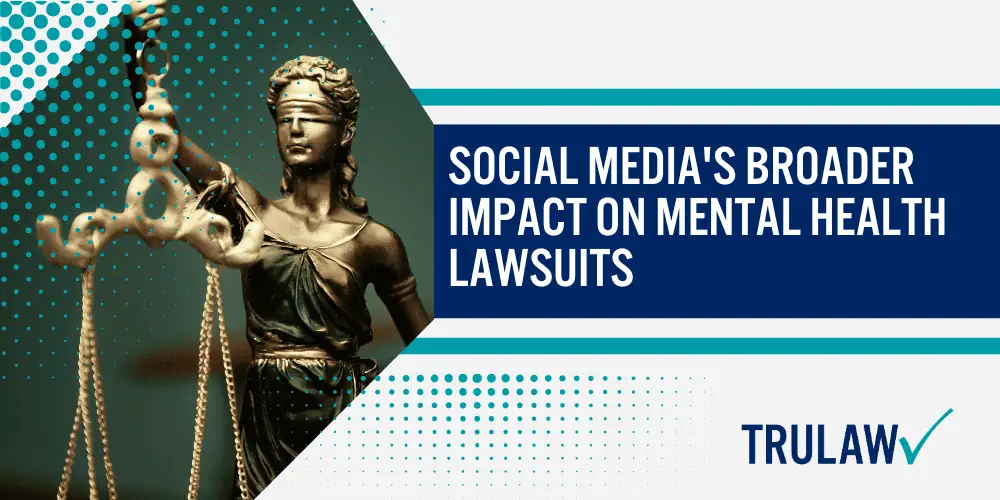
This has led to an increase in lawsuits filed against these platforms, with plaintiffs claiming that the companies failed to adequately warn users about these potential risks and did not take sufficient measures to protect users’ mental health.
In response to these lawsuits, social media platforms have taken steps to address these issues by implementing new features and policies.
However, critics argue that these measures are not enough and that more needs to be done to protect users’ mental health.
Organizations Advocating for Student Mental Health: Raising Awareness and Supporting Victims
The increasing number of legal proceedings against these educational and student-centric organizations underscores the escalating acknowledgement of the necessity for responsibility.
The influence is not confined to a single platform but spreads to the entire spectrum of social media usage in educational settings and among students.
Mental Health Impacts on Students: The Alarming Consequences of Excessive Social Media Use
The advent of organizations that provide support for individuals grappling with mental health issues due to their use of social media platforms is noteworthy.
These organizations have a pivotal role in creating awareness about the harmful effects of excessive social media use and championing the rights of student victims.
The effects of social media, such as Instagram on Mental health, on students due to extended exposure are varied and concerning.
Research has established a link between heavy social media usage by students and a rise in anxiety, depression, loneliness, and low self-esteem among student users.
The continuous comparison with meticulously crafted online personas can induce feelings of inadequacy in students, leading to a mental health crisis.
Legal proceedings have been initiated against Instagram and other social media companies, accusing them of negligence in protecting the mental health of their users, particularly students.
These lawsuits aim to seek compensation for students who have experienced a deterioration in their mental health due to their experiences on these platforms.
The suits also aim to hold these companies accountable for their failure to adequately address these issues.
In many of these cases, the student plaintiffs argue that these social media platforms knowingly exploit psychological vulnerabilities by incorporating addictive features that encourage prolonged use by students.
This pattern of behavior has led to comparisons between excessive social media use and substance abuse disorders by some experts.
The legal disputes concerning the mental health issues induced by social media underscore the pressing requirement for industry regulation.
Although some detractors contend that personal accountability is key, it is imperative to acknowledge the authority and sway these platforms hold in shielding students from possible harm and offering resources for those grappling with mental health problems.
Steps are being taken to address these issues through a variety of methods, such as proposed laws and heightened public awareness initiatives.
It is vital for social media corporations to adopt proactive measures to lessen the adverse effects of their platforms on mental health.
This could entail the introduction of features encouraging healthy usage patterns, the provision of mental health resources within the applications, or cooperation with professionals in the field.
Instagram Lawsuit: Addictiveness and School Districts' Claims
Instagram, the widely utilized social media platform, has been accused of being deliberately addictive, leading to an overuse among its users.
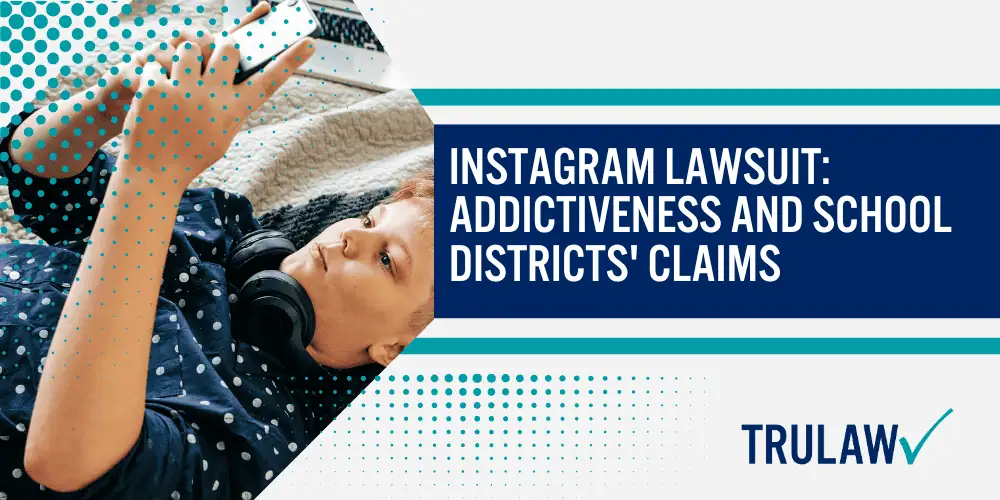
This has initiated a legal action against the corporation, with educational institutions participating and asserting that students’ scholastic performance is being adversely impacted due to their fixation with the platform.
Concerns for Students’ Academic Performance: The Impact of Excessive Instagram Use
The primary subject of the lawsuit against Instagram is the platform’s addictive qualities.
The criticism is that the application’s design elements are intentionally constructed to retain users for prolonged durations.
The continuous notifications, infinite scrolling features, and personalized, engaging content contribute to users spending significant amounts of time on the platform.
Overuse of screen time can result in numerous negative outcomes, such as deteriorated mental health and decreased productivity.
Calls for Stricter Regulations: Addressing Social Media Addiction and Its Consequences
The impact of Instagram usage on the academic performance of students is a matter of significant concern for school districts.
Studies indicate that excessive use of social media can adversely affect individuals’ ability to concentrate and their cognitive functions.
Teenagers, especially, may struggle to maintain a balance between their online activities and their academic responsibilities.
The incessant need for approval, manifested through likes and comments, can divert their attention from their studies.
Given these concerns, there is a growing demand for more rigorous regulations concerning addictive elements within social media platforms such as Instagram.
Some individuals contend that these platforms should bear responsibility for their part in exacerbating mental health problems among young adults and teenagers.
It is suggested that by introducing strategies such as reducing screen time or offering tools to manage usage, individuals may be able to regain mastery over their digital behaviors.
California has adopted a forward-thinking approach to this problem by initiating a lawsuit against Instagram’s parent company, Facebook Inc.
The legal action underscores potential infringements of consumer protection legislation, focusing on alleged misleading practices aimed at children and young adults.
The lawsuit’s primary objective is to scrutinize the ways in which social media platforms manipulate user behavior and question if they prioritize financial gain over the welfare of their users.
While some individuals might argue that personal accountability should be a crucial factor in regulating one’s Instagram use, it is critical to recognize the addictive characteristics of these platforms and the impact they may have on susceptible individuals.
The lawsuit acts as a platform to increase awareness of the potential dangers associated with overuse of social media and to stimulate conversations about responsible digital participation.
Facebook's Liability in the Instagram Mental Health Lawsuit
Facebook, the parent company of Instagram, is currently embroiled in a legal controversy concerning mental health issues.
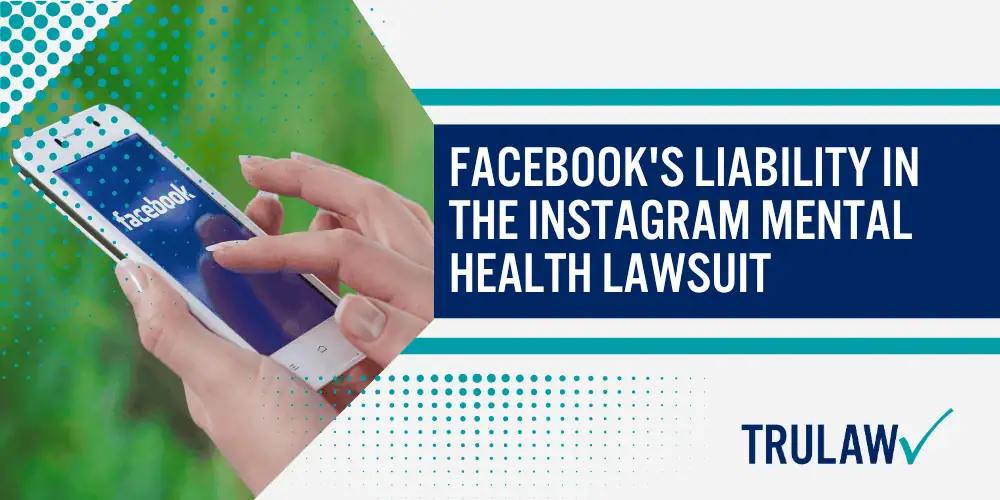
The lawsuits that are being filed, which focus on the impact of Instagram on mental health, have sparked debates about the level of responsibility that Facebook should bear in protecting its user base.
Allegations of Prioritizing Profits: The “Facebook Papers” and Their Impact
The subject of this article pertains to the accusations leveled against Facebook for reportedly prioritizing monetary gains over the welfare of its users.
This is purportedly achieved by permitting damaging content to spread unchecked across its platforms.
The credibility of these allegations is further bolstered by the recent unearthing of internal documents, referred to as the “Facebook Papers” or “Facebook Files.”
The disclosed documents provide insight into Facebook’s awareness of the potential adverse impact its platforms can have on mental health.
Breach of Duty of Care: Facebook’s Responsibility Under Legal Scrutiny
The central focus of the legal contention against Facebook is the claim that the social media giant should have put in place measures to lessen the mental health risks linked to the use of their services, specifically Instagram.
The argument posits that Facebook has failed in its duty of care towards its users by not taking necessary steps.
A critical element under scrutiny is the potential liability of Facebook under product liability laws.
Product liability is a company’s obligation for any harm caused by its products or services.
In this context, legal experts argue that Instagram, a product under Facebook’s ownership, has resulted in negative mental health impacts among its users due to a lack of sufficient protections and algorithms that escalate harmful content.
The legal accountability of Facebook is currently being examined due to allegations of neglecting its duty of care.
Laurie Bergman, a legal representative involved in the associated lawsuits, has stated that Facebook cannot shirk its responsibilities by merely identifying itself as a platform.
She further highlighted that as the parent company with substantial influence over Instagram’s rules and operations, Facebook should be held legally responsible for any resulting damage.
Another legal representative, Robert Alexis Toney Roberts, who is also representing the plaintiffs, asserts that there is significant evidence indicating the detrimental effects of Instagram on the mental health of young users.
He draws attention to research studies that establish a connection between excessive use of social media and increased instances of depression and anxiety in teenagers.
This evidence underscores the argument against Facebook for its failure to take adequate measures to mitigate these known risks.
The objective of these lawsuits is to emphasize the necessity for Facebook to give precedence to the well-being of its users over its profits.
The lawsuits are seeking not just monetary compensation, but also alterations in the operational methods of Facebook’s platforms to lessen their negative impact on mental health.
Unrealistic Expectations and Self-Harm Messages on Instagram
Legal proceedings have brought to light allegations that Instagram promotes a culture of comparison and unrealistic expectations among its users, which has a detrimental impact on mental health.
This is particularly prevalent among young females who are exposed to manipulated images and idealized lifestyles, leading to feelings of insufficiency and diminished self-esteem.
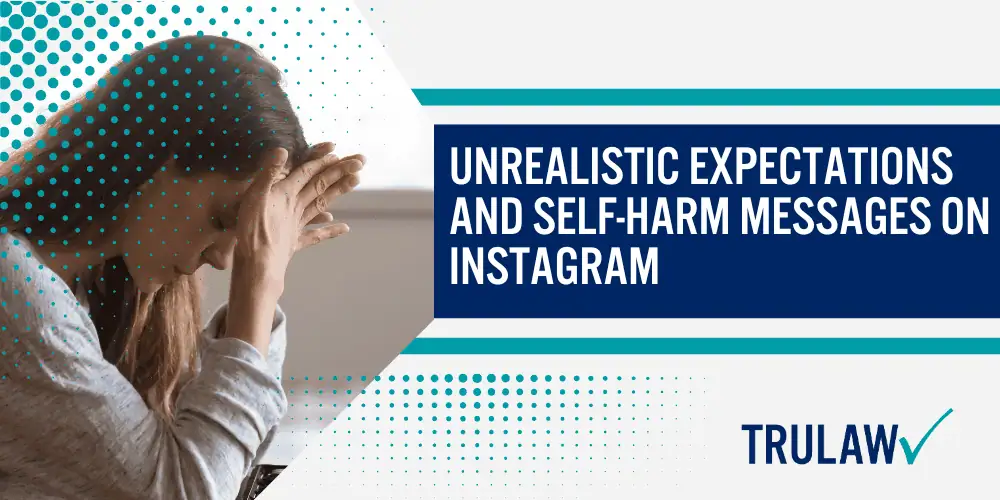
Additionally, these legal proceedings underscore cases where Instagram did not take swift action to remove content promoting self-harm, thereby posing potential risks to its susceptible users.
Prevalence of Low Self-Esteem and Body Image Issues
The issue of low self-esteem and body image problems is increasingly prevalent among users of the social media platform, Instagram.
The platform’s focus on physical attractiveness and the portrayal of idealized lifestyles has led to a skewed understanding of reality.
Adolescent females are particularly vulnerable to these pressures, as they find themselves comparing their own bodies and lives to the heavily edited and manipulated images presented by influencers and their peers on the platform.
This continuous exposure can result in symptoms of depression, intensifying any existing self-esteem problems or causing new ones to develop.
If you are one of the individuals affected by the negative mental health impacts of this social media platform, you are encouraged to reach out to us for more information about our Instagram mental health lawsuit.
Risks of Self-Harm Messages and Grooming Incidents
The rise in self-harm messages on Instagram is a concerning outcome of the platform’s current culture.
Despite the platform’s attempts to mitigate harmful content, there have been instances where such material remains accessible for prolonged periods, as revealed in various lawsuits against Instagram.
This is particularly distressing and potentially hazardous for individuals grappling with suicidal thoughts or emotional trauma from previous suicide attempts, who may come across this explicit content.
Furthermore, it is not only self-harm messages that pose a risk.
There have been reported cases of sexual messages directed at young girls on Instagram.
Predatory individuals have exploited the platform to groom vulnerable teenagers.
These incidents underscore the immediate need for more stringent moderation policies and improved safety measures on social media platforms.
Addressing Concerning Trends and Taking Action
Instagram and similar platforms must take immediate action in the following key areas to address these alarming trends:
- Stricter content moderation implementation: Development of enhanced algorithms is necessary to quickly identify detrimental content while reducing the occurrence of false positives.
- Improvement of user reporting mechanisms: The ease of reporting concerning posts should be increased to empower users.
- Provision of mental health resources: Partnerships should be formed with mental health organizations to provide support and resources directly within the application, assisting users who may be struggling.
- Promotion of body positivity: Influencers and users should be encouraged to accept a variety of body types and promote a healthy self-image, countering the propagation of unrealistic standards.
- Education on responsible social media usage: Users should be guided towards critical thinking, media literacy, and digital well-being to enable them to navigate platforms more consciously.
Understanding the Significance of the Instagram Mental Health Lawsuit
The recent lawsuit against Instagram regarding mental health issues marks a significant event.
Drawing attention to the profound effects that social media can exert on mental health.
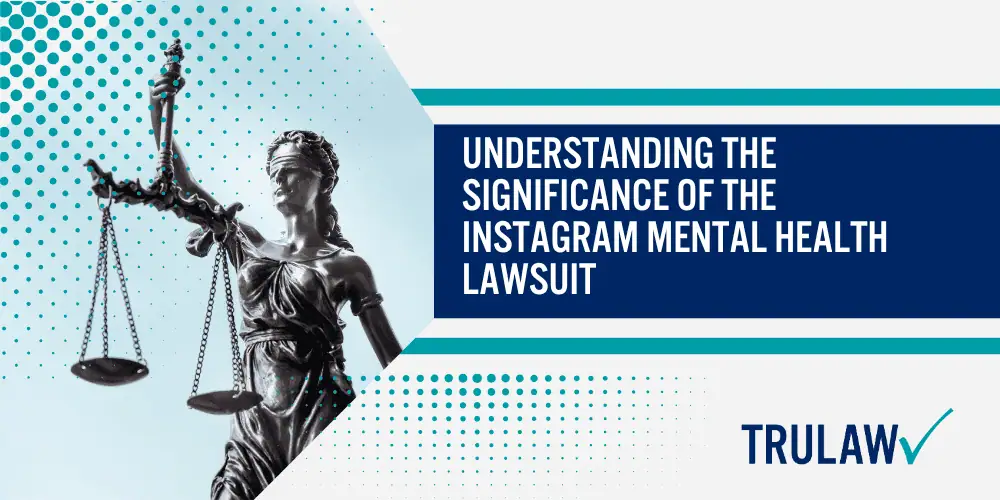
This legal dispute underscores the potential risks associated with the overuse of platforms such as Instagram.
And prompts important discussions about the obligations of technology companies in protecting the mental health of users.
Implications for Future Regulations and Policies
The potential implications of this lawsuit on future regulations and policies related to social media platforms are considerable.
As the negative impacts of excessive screen time on mental health become more widely recognized, there is an escalating demand for tech companies to be held accountable for their part in intensifying these issues.
The result of this lawsuit could establish a precedent for more stringent regulations and guidelines designed to shield individuals from harmful online content.
Furthermore, the lawsuit against Instagram has initiated a crucial dialogue concerning the responsibility that large tech companies such as Instagram have in safeguarding user well-being.
Social media platforms have long been criticized for creating an environment that encourages comparison, bullying, and unrealistic expectations.
This legal action has brought these issues to the forefront, calling for companies to take preventive measures to reduce such negative effects.
The Impact of Social Media on Mental Health
The influence of social media on mental health is a significant issue that merits attention.
Research evidence suggests that excessive utilization of social media platforms, such as Instagram, can result in heightened feelings of anxiety, depression, diminished self-esteem, and issues related to body image.
The continuous exposure to meticulously selected highlights of others’ lives can lead individuals to draw negative comparisons with their own lives and foster an unhealthy obsession with seeking approval through social media likes and comments.
Additional research points to the prevalence of cyberbullying on social media platforms like Instagram.
The anonymity that online interactions offer often encourages individuals to partake in harmful behavior without immediate repercussions.
This hostile environment can have serious implications for an individual’s mental health, resulting in elevated stress levels and even thoughts of suicide.
It is paramount that technology companies such as Instagram to acknowledge the role they play in shaping the experiences of their users and to take preemptive steps to prioritize mental health.
This can be achieved by introducing features that encourage positive engagement, such as warning labels on potentially distressing content, offering resources for mental health support, and creating algorithms that value meaningful relationships over superficial engagement metrics.
Potential Injuries and Damages in an Instagram Mental Health Lawsuit
In recent times, there has been a noticeable increase in personal injury lawsuits directed at Instagram.
These lawsuits aim to obtain compensation for emotional distress, the expenses related to therapy, and other damages that have been incurred as a result of using the platform.
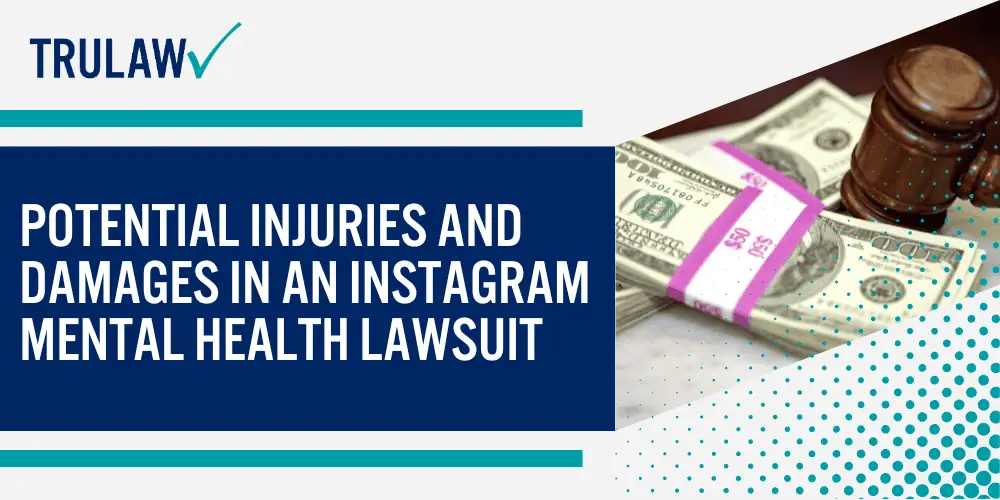
Such legal actions underscore the harmful effects that prolonged exposure to detrimental content on Instagram can have on the mental health of its users.
Claims of Severe Psychological Injuries
In the recent Instagram lawsuits, there have been assertions that individuals have incurred significant psychological harm due to their usage of Instagram.
The algorithmic feed of the platform frequently exposes its users to distressing imagery, cyber harassment, and unattainable standards of beauty.
These exposures often result in feelings of inferiority, anxiety, depression, and in some cases, suicidal ideation.
The claimants argue that such experiences have gravely affected their overall psychological health.
The crux of these personal injury lawsuits primarily revolves around the possible damages inflicted upon the users due to their extended usage of Instagram.
The plaintiffs assert that the damage caused by the platform should be recognized and monetarily compensated.
They maintain that Instagram has not fulfilled its responsibility to safeguard its users from harmful content and thus, should be held responsible for the adverse effects experienced by the affected individuals.
Specific Examples of Potential Damages
In order to comprehend the seriousness of potential damages, it is crucial to examine some specific instances:
- Psychological Trauma: Users report considerable psychological trauma due to exposure to distressing content or episodes of online bullying on Instagram. This trauma can present itself in the form of panic attacks, sleep disorders, lack of appetite, or even post-traumatic stress disorder (PTSD).
- Counseling Expenses: Many individuals who are grappling with mental health issues after extensive use of Instagram find it necessary to seek professional assistance through therapy or counseling. The expenses related to continuous therapy can add up significantly over time.
- Decreased Efficiency: Extended exposure to harmful content on Instagram can result in a decrease in productivity at work or in school due to increased distraction and mental exhaustion brought on by negative emotions triggered by the platform.
- Social Withdrawal: Users may notice a decrease in their social interactions and relationships as they become more absorbed in the negative aspects of Instagram. This withdrawal can further intensify feelings of loneliness and depression.
- Issues with Self-worth: Regular exposure to meticulously selected, idealized depictions of others’ lives on Instagram frequently leads to comparisons and feelings of inadequacy. This can have a harmful effect on users’ self-esteem, leading to a negative self-perception.
Conclusion: Key Takeaways from the Instagram Mental Health Lawsuit
The legal action against Instagram, which is centered around the platform’s potential impact on the mental health of young users, has brought several significant issues to the forefront.
It is essential to comprehend the main points from this lawsuit and their effects on individuals, families, and the wider society.
To begin, families have initiated a lawsuit against Instagram, attributing the platform’s possible role in inducing mental health problems among young users.
This underscores the escalating worry over the sway of social media platforms on susceptible individuals.
Moreover, this lawsuit has drawn attention to the connection between Instagram and eating disorders.
The platform’s focus on unattainable beauty standards could lead to body image issues and disordered eating behaviors among its users.
The increasing prevalence of social media related mental health lawsuits has underscored the significance of examining the potential culpability of these platforms.
It is becoming increasingly clear that these platforms might be held accountable for any negative impact they may have on the mental health of their users.
The issue of addiction was a critical point brought up in the Instagram litigation.
Educational institutions have alleged that excessive usage of Instagram by students has led to behaviors akin to addiction, which in turn, has had a negative effect on their academic achievements.
Facebook, as the parent company of Instagram, has found itself at the center of a debate regarding its responsibility for any harm caused by Instagram.
This has led to a broader discussion on corporate accountability in terms of content regulation and safeguarding the mental health of users.
The lawsuit against Instagram also highlighted the issue of unrealistic expectations set by influencers and the presence of self-harm messages on the platform.
It was argued that the platform’s algorithms could potentially magnify harmful content, resulting in detrimental psychological effects for susceptible individuals.
The conclusion of the lawsuit regarding Instagram and mental health is a significant milestone that paves the way for future legal proceedings against social media platforms on matters related to mental health.
This case underscores the necessity for heightened awareness, regulation, and accountability within these online environments.
The lawsuit has brought attention to the potential injuries and damages associated with mental health problems that may arise from the use of Instagram.
These potential damages encompass emotional turmoil, reduced self-esteem, and instances of self-harm.
It is vital for individuals to acknowledge these possible dangers in order to safeguard themselves and seek the necessary assistance.
To summarize, the Instagram mental health lawsuit has illuminated the adverse impacts of social media on our mental health.
This serves as an alert for users, parents, regulators, and the platforms themselves to confront the issues presented by these online spaces.
By advocating responsible usage, cultivating positive online communities, and seeking help when required, we can aim for a healthier interaction with social media platforms.
Social Media Harm Lawsuits Frequently Asked Questions
-
What are the key takeaways from the Instagram Lawsuit for Mental Health Impacts?
The main points from the Instagram Lawsuit for mental health effects are:
- The lawsuit emphasizes the potential harm Instagram can inflict on users’ mental health and raises questions about the platform’s responsibility in ensuring user well-being.
Key Takeaways
The Instagram Mental Health Lawsuit has brought several critical issues to the forefront.
It underscores the potential mental health risks associated with using the platform.
Moreover, it raises pertinent questions about the extent of responsibility that platforms like Instagram should bear in ensuring the well-being of their users.
To conclude, the lawsuit serves as a stark reminder of the potential pitfalls of social media and the importance of platforms taking proactive measures to safeguard user mental health.
-
What are potential injuries in an Instagram Mental Health Lawsuit?
Potential injuries in the Instagram Mental Health Lawsuit include:
- Depression
- Anxiety
These injuries are especially prevalent among teens and young adults.
Potential Injuries in the Instagram Mental Health Lawsuit
Instagram, like many social media platforms, has been linked to various mental health issues.
The most common among these are depression and anxiety.
These conditions are especially prevalent among the younger demographic, including teens and young adults.
To conclude, the primary potential injuries from Instagram use revolve around mental health issues, with depression and anxiety being the most common.
-
Is there an Instagram Class Action Lawsuit?
At present, there is no known specific class action lawsuit against Instagram.
Current Status of the Instagram Mental Health Lawsuit
While there isn’t a specific lawsuit against Instagram, it’s worth noting that other tech giants, such as Apple, have faced lawsuits in the past, like the ‘Batterygate’ issue.
To conclude, while there isn’t a direct lawsuit against Instagram currently, it’s always a good idea to stay updated with recent news or legal databases for the latest information.
-
What is the investigation into Meta about regarding its impact on teens?
Below are the Meta investigation details:
- State attorneys general are probing Meta, previously known as Facebook, concerning its potential harmful effects on teens.
Investigation Details
Meta, which was previously known as Facebook, is currently under investigation by state attorneys general.
The primary focus of this investigation is to determine the potential harmful effects that Meta’s social media platforms might have on teenagers.
To conclude, the investigation into Meta is centered around its potential adverse impacts on the mental well-being of teenagers.
-
How did Meta's Instagram allegedly cause eating disorders?
Allegations against Meta’s Intagram platform include:
- A preteen girl reportedly developed an eating disorder, self-harmed, and experienced suicidal thoughts due to her prolonged use of Instagram.
Allegations Include
A lawsuit has been filed against Meta, alleging that a preteen girl’s prolonged use of Instagram led her to develop an eating disorder.
Additionally, she reportedly began to self-harm and had suicidal thoughts.
To conclude, the lawsuit against Meta suggests that prolonged use of Instagram can have severe mental health repercussions, as evidenced by the case of the preteen girl.
-
Why are more than 1,200 families suing social media companies over kids' mental health?
Below are the reasons for that over 1,200 families are filing Social Media Mental Health Lawsuits:
- Over 1,200 families are alleging that platforms like TikTok, Snapchat, YouTube, Roblox, and Meta’s Instagram have negative effects on children’s mental health.
Reasons for the Lawsuit
A significant number of families, totaling over 1,200, have come forward to sue various social media platforms.
The primary contention is that these platforms, which include TikTok, Snapchat, YouTube, Roblox, and Meta’s Instagram, have had detrimental impacts on the mental health of their children.
To conclude, the surge in lawsuits against social media companies underscores the growing concern among parents about the potential harm these platforms can inflict on children’s mental well-being.
-
How is the Spence family related to the lawsuit against Meta?
Below are the Spence Family’s allegations against Meta:
- The Spence family claims that Instagram, a Meta-owned platform, played a role in fostering “addictive behaviors” in their preteen daughter, which subsequently led to her developing an eating disorder.
Spence Family’s Allegations
The Spence family has become a focal point in the lawsuit against Meta.
Their primary allegation is that Instagram, which is owned by Meta, contributed to creating “addictive behaviors” in their preteen daughter.
This addiction, they claim, was a significant factor in her developing an eating disorder.
To conclude, the Spence family’s case highlights the potential dangers of social media platforms and their possible role in exacerbating mental health issues among young users.
-
How are Instagram and eating disorders connected according to recent lawsuits?
Recent lawsuits have claimed the following:
- Recent lawsuits suggest that Meta’s Instagram might play a role in promoting eating disorders among its teenage users.
Recent Lawsuit Claims
Several lawsuits have been filed that draw a connection between Instagram and the rise of eating disorders, especially among teenagers.
These lawsuits propose that the platform, by promoting certain body images and lifestyles, may inadvertently encourage unhealthy eating habits and body perceptions.
To conclude, the legal challenges against Instagram emphasize the platform’s potential role in fostering unhealthy body images and eating disorders, especially among its younger demographic.
-
How did a preteen girl's use of Instagram result in an eating disorder and self-harm?
Below is the allegation being made against Meta for their role in a preteen girl’s development of an eating disorder:
- A lawsuit against Meta alleges that a preteen girl’s extensive use of Instagram led her to develop an eating disorder, engage in self-harm, and have suicidal thoughts.
Case Details
A particular lawsuit has brought to light the case of a preteen girl whose extensive use of Instagram allegedly had severe repercussions on her mental health.
The claim suggests that her exposure to certain content on the platform resulted in her developing an eating disorder.
Furthermore, she began to self-harm and had suicidal ideations.
To conclude, this case underscores the potential dangers of prolonged and unmonitored use of social media platforms like Instagram, especially among younger users.
-
What are the claims of product liability in social media lawsuits alleging mental health issues in minors?
Claims of product liability in social media lawsuits include, but are not limited to, the following:
- Lawsuits are using product liability claims to address the connection between social media and minors’ mental health issues, aiming to bypass Section 230 protections that typically shield platforms.
Overview of Claims Being Made Against Social Media Platforms
In recent times, several lawsuits have leveraged product liability claims as a strategy against social media companies.
The primary aim is to address the apparent link between the use of these platforms and the deterioration of mental health among minors.
By using product liability claims, these lawsuits hope to circumvent the Section 230 protections that usually provide immunity to these platforms.
To conclude, the rise in product liability claims in these lawsuits signifies a shift in legal strategy, aiming to hold social media platforms more accountable for their potential adverse effects on minors.

Managing Attorney & Owner
With over 25 years of legal experience, Jessica Paluch-Hoerman is an Illinois lawyer, a CPA, and a mother of three. She spent the first decade of her career working as an international tax attorney at Deloitte.
In 2009, Jessie co-founded her own law firm with her husband – which has scaled to over 30 employees since its conception.
In 2016, Jessie founded TruLaw, which allows her to collaborate with attorneys and legal experts across the United States on a daily basis. This hypervaluable network of experts is what enables her to share the most reliable, accurate, and up-to-date legal information with our readers!
Additional Social Media Harm Lawsuits resources on our website:
Here, at TruLaw, we’re committed to helping victims get the justice they deserve.
Alongside our partner law firms, we have successfully collected over $3 Billion in verdicts and settlements on behalf of injured individuals.
Would you like our help?
At TruLaw, we fiercely combat corporations that endanger individuals’ well-being. If you’ve suffered injuries and believe these well-funded entities should be held accountable, we’re here for you.
With TruLaw, you gain access to successful and seasoned lawyers who maximize your chances of success. Our lawyers invest in you—they do not receive a dime until your lawsuit reaches a successful resolution!
AFFF Lawsuit claims are being filed against manufacturers of aqueous film-forming foam (AFFF), commonly used in firefighting.
Claims allege that companies such as 3M, DuPont, and Tyco Fire Products failed to adequately warn users about the potential dangers of AFFF exposure — including increased risks of various cancers and diseases.
Depo Provera Lawsuit claims are being filed by individuals who allege they developed meningioma (a type of brain tumor) after receiving Depo-Provera birth control injections.
A 2024 study found that women using Depo-Provera for at least 1 year are five times more likely to develop meningioma brain tumors compared to those not using the drug.
Suboxone Tooth Decay Lawsuit claims are being filed against Indivior, the manufacturer of Suboxone, a medication used to treat opioid addiction.
Claims allege that Indivior failed to adequately warn users about the potential dangers of severe tooth decay and dental injuries associated with Suboxone’s sublingual film version.
Social Media Harm Lawsuits are being filed against social media companies for allegedly causing mental health issues in children and teens.
Claims allege that companies like Meta, Google, ByteDance, and Snap designed addictive platforms that led to anxiety, depression, and other mental health issues without adequately warning users or parents.
Transvaginal Mesh Lawsuits are being filed against manufacturers of transvaginal mesh products used to treat pelvic organ prolapse (POP) and stress urinary incontinence (SUI).
Claims allege that companies like Ethicon, C.R. Bard, and Boston Scientific failed to adequately warn about potential dangers — including erosion, pain, and infection.
Bair Hugger Warming Blanket Lawsuits involve claims against 3M — alleging their surgical warming blankets caused severe infections and complications (particularly in hip and knee replacement surgeries).
Plaintiffs claim 3M failed to warn about potential risks — despite knowing about increased risk of deep joint infections since 2011.
Baby Formula NEC Lawsuit claims are being filed against manufacturers of cow’s milk-based baby formula products.
Claims allege that companies like Abbott Laboratories (Similac) and Mead Johnson & Company (Enfamil) failed to warn about the increased risk of necrotizing enterocolitis (NEC) in premature infants.
Here, at TruLaw, we’re committed to helping victims get the justice they deserve.
Alongside our partner law firms, we have successfully collected over $3 Billion in verdicts and settlements on behalf of injured individuals.
Would you like our help?
